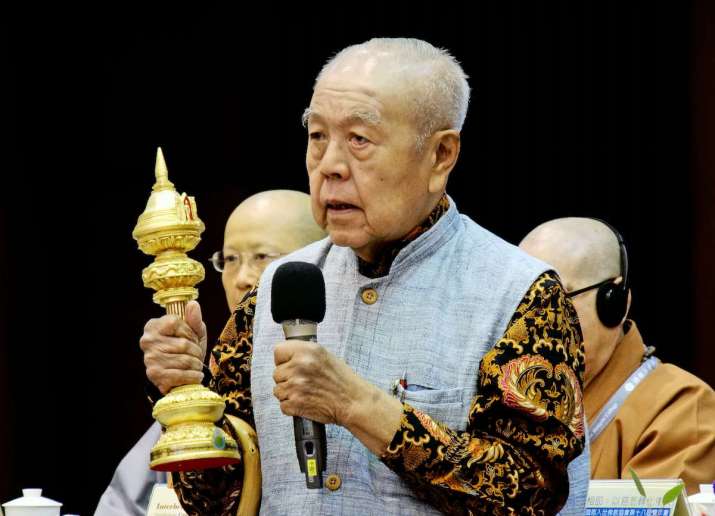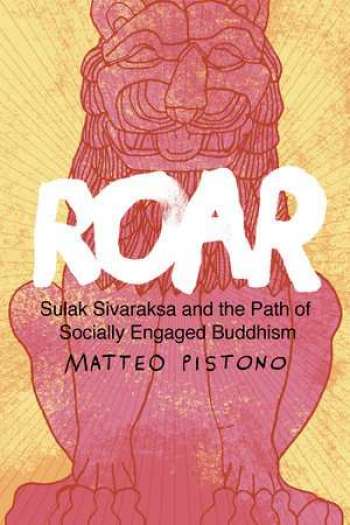The recently published biography, Roar: Sulak Sivaraksa and the Path of Socially Engaged Buddhism, explores the life and times of one of the most significant figures in contemporary socially engaged Buddhism. Renowned as one of Asia’s leading intellectual voices, Sulak, the co-founder of the Thailand-based International Network of Engaged Buddhists (INEB) has risen to global prominence through his focused, persistent, and insightful vision of a more equitable, compassionate society.
“Roar explores Sulak’s influence in shaping the social and political landscape during an oppressive Thai monarchy. Sulak’s outspoken activism against oppression, authority, and the marginalization of the poor in Thailand caused him to face exile and multiple persecutions. Sulak represents the 21st century activist: mindful, skillful, kindhearted, outspoken, loud and persistent,” said Maria Akhter at publisher North Atlantic Books. “In today’s political climate, a book like Roar is essential in helping youth and activists understand ways to influence social change that don't involve anger, rioting, and despair.”
With anecdotes from Sulak’s upbringing and early life through to his decades-long struggle for social justice, Roar aims to offer the reader an insight into how he learned to address the suffering of the poor and oppressed by engaging with and participating in their suffering, with an unwavering commitment to the Buddhist ideals.
Twice nominated for the Nobel Peace Prize, in 1993 and 1994, and in 1995 a recipient of the Right Livelihood Award (dubbed the Alternative Nobel Prize), Sulak, who turns 86 on 27 March, has worked at the forefront of the global engaged Buddhism movement, which offers the means to radically transform human society into the basis for a more equitable, compassionate world, driven by a spiritual commitment to manifest a social development model rooted in democracy, justice, and cultural integrity.
Roar, which was officially released this month, has received praise from a number of prominent figures in the global Buddhist community, including the Dalai Lama, Thich Nhat Hanh, Roshi Joan Halifax, and Stephen Batchelor:
Although material advances have contributed enormously to human welfare, they cannot create lasting happiness by themselves. I believe [Sulak] and I share a conviction that if we are to solve human problems, economic and technological development must be accompanied by an inner spiritual growth. And if we succeed in fulfilling both these goals, we will surely create a happier and more peaceful world. — His Holiness the Dalai Lama.
This rare and powerful book conveys the powerful spirit of a true humanitarian and courageous human being, Sulak Sivaraksa. Roar is the roar of a lion of a man, whose vision of human liberation is an example for us all. Written with rugged honesty and utter clarity, this book is a great treasure that teaches us all that compassion in action is the very heart of ethics. Bravo! All who know [Sulak] have been waiting for the full story of his life and work. — Roshi Joan Halifax.
Roar’s US-born author Matteo Pistono holds an MA in Indian philosophy from the School of Oriental and African Studies at the University of London. He is also the author of Meditation: Coming to Know Your Mind, Fearless in Tibet: The Life of the Mystic Tertön Sogyal, and In the Shadow of the Buddha: One Man's Journey of Discovery in Tibet. Pistono spent three years researching and writing Roar, recording more than 50 hours of interviews with Sulak, with full access to Sulak’s personal library and large circle of friends, colleagues, and associates.
Established in 1989 by Sulak and a group of likeminded Buddhist and non-Buddhist thinkers and social activists, INEB operates as an autonomous organization under the Bangkok-based Sathirakoses-Nagapradeepa Foundation. Comprised of individual members and organizations from more than 25 countries across Asia, Australia, Europe, and North America, and operating around the core value and practice of kalyana-mitrata (Skt. spiritual friendship), INEB seeks to cultivate and promote an understanding of socially engaged Buddhism that integrates the practice of Buddhism with social action to manifest a healthy, just, and peaceful world.
















